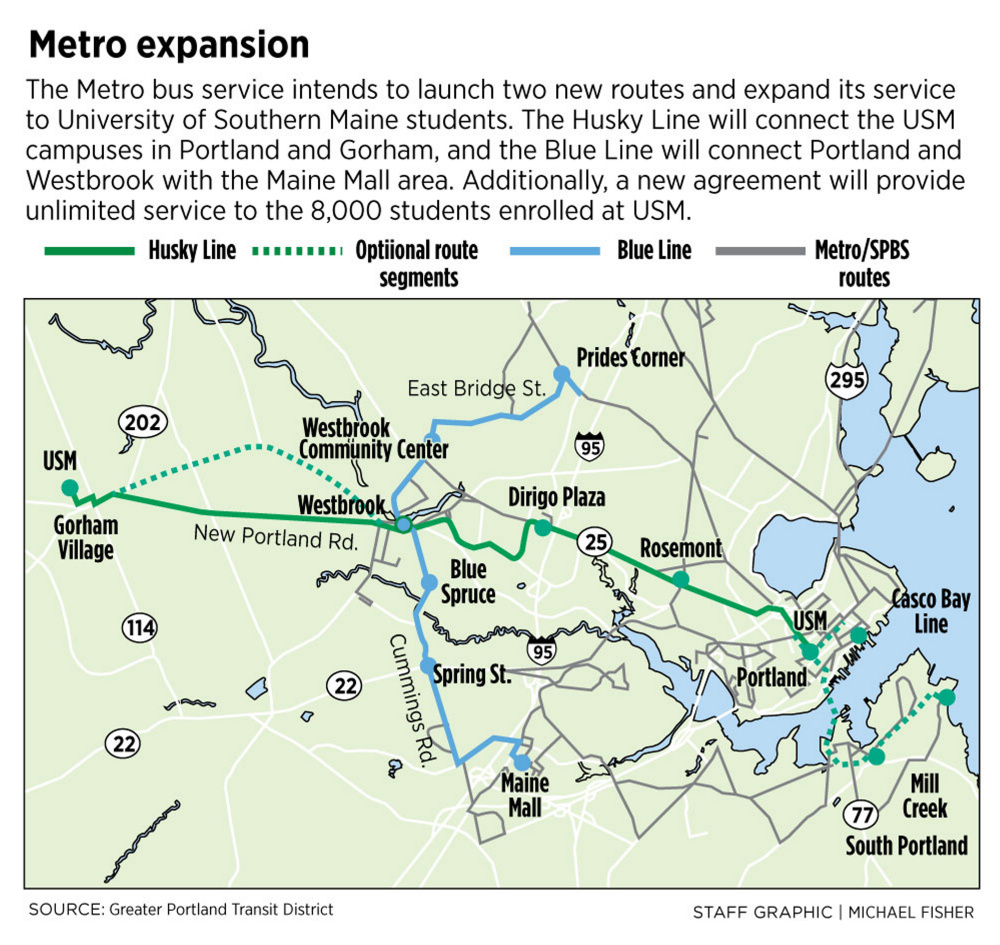Next summer, the Portland area will see an exciting new expansion of bus service to Gorham. In partnership with the University of Southern Maine, Metro (the Greater Portland Transit District) will launch the Husky Line connecting USM’s Gorham and Portland campuses and adding 8,000 USM students to the region’s public transportation network.
But this new route is not just for students. It will be open to the public in every community along the way.
The Husky Line partnership between USM and Metro will free up resources to dramatically improve public transportation for people who use the bus in Portland, Westbrook and Gorham. Today, taking a bus from downtown Westbrook to the Maine Mall takes nearly two hours. To bring that trip time down to under 30 minutes, Metro will introduce a new bus line.
The Husky Line is just the latest boost to public transportation in the Portland region. We’ve long had the economic engines of the Casco Bay ferry and the Downeaster train. In 2012, train service reached beyond Portland to Brunswick. In 2013, a brand-new bus line, the Lakes Region Explorer, began connecting people in Bridgton, Casco, Windham, Raymond, Westbrook and Portland. Last summer, the Metro BREEZ bus launched a line for people in Freeport, Yarmouth and Portland. In just a few weeks from now, that service will be extended farther north to Brunswick residents.
ShuttleBus-ZOOM customers in Biddeford, Saco and Old Orchard Beach now enjoy weekend bus service, and South Portland Bus recently added Sunday service. More improvements are on the horizon since federal funding for public transportation in our region has increased fivefold in the last five years.
Public transportation is on the move in the region. It’s wiring all of us together.
But why is that so important?
Because growing communities need fast, efficient public transportation. A strong network of ferries, trains and buses is an essential element of economic prosperity. As Richard Barringer, professor emeritus at USM’s Muskie School of Public Service, said on a recent National Public Radio “On Point” broadcast, the need for better public transportation may be the most important factor in spurring regional economic growth. Public transportation connects people to jobs. It expands economic opportunity by widening the geography of possible job opportunities for those without cars. It connects students with schools, colleges and universities.
A more robust network will free us from our cars, which can attract younger people to our region, thus addressing our demographic needs in a way that few other strategies can.
Public transportation has many other benefits, too. It enables the young, the elderly and everyone in the workforce to travel in our region without adding to our growing traffic problems. It allows our cities to thrive, reducing the need for expensive parking garages and land-consuming lots. It reduces the amount of money families have to spend on transportation, improves access to more-affordable housing and facilitates independent living for our elderly residents and people with disabilities. Public transportation is also a key strategy for reducing our carbon footprint.
At the Greater Portland Council of Governments, we have prioritized making our entire region, from Casco Bay to westernmost Cumberland County, a more vital and healthier place full of economic opportunities. Our new strategic plan advances the collective priorities of our 26 member cities and towns to spur economic development and build prosperity in our region. For our communities to realize this vision for a prosperous future, the region needs an expanded and more efficient public transportation network.
That’s why we are proud today to congratulate Metro and USM on their new Husky Line. We thank all their partners. The cities of Westbrook and Portland, the town of Gorham, the Maine Department of Transportation and the Portland Area Comprehensive Transportation System are all helping to build stronger transportation for all of us. As private investments are unlocked by public partnerships like this one, we are confident that our entire region will move toward a healthier, more robust social and economic future.
Copy the Story LinkSend questions/comments to the editors.



Success. Please wait for the page to reload. If the page does not reload within 5 seconds, please refresh the page.
Enter your email and password to access comments.
Hi, to comment on stories you must . This profile is in addition to your subscription and website login.
Already have a commenting profile? .
Invalid username/password.
Please check your email to confirm and complete your registration.
Only subscribers are eligible to post comments. Please subscribe or login first for digital access. Here’s why.
Use the form below to reset your password. When you've submitted your account email, we will send an email with a reset code.